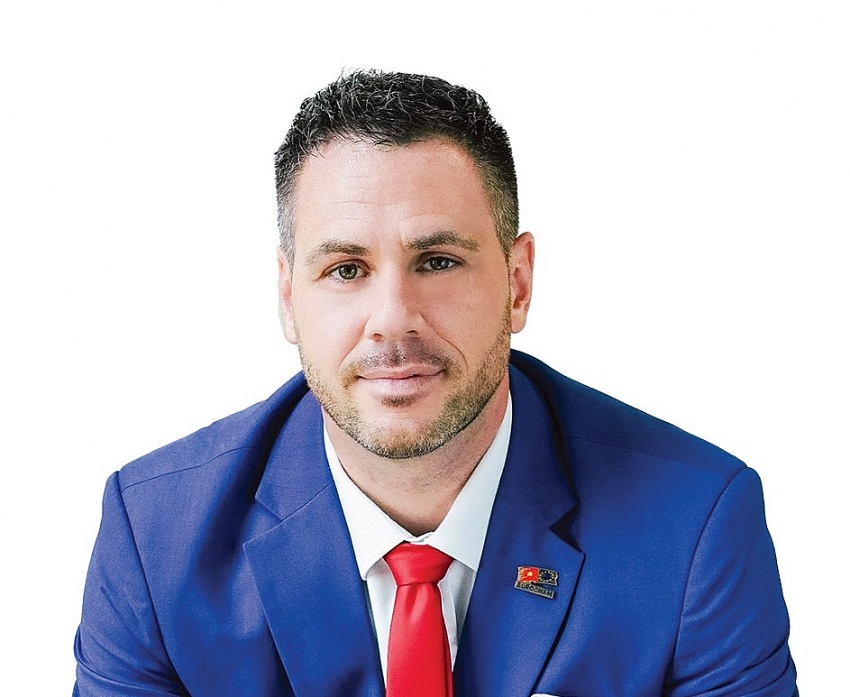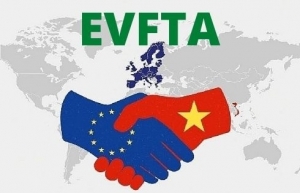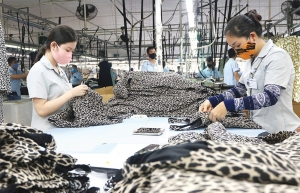EVFTA can be long-term success story
Has the EVFTA met expectations from the two sides in terms of investment, trade, and tech transfer?
 |
| Dominik Meichle, chairman of the European Chamber of Commerce in Vietnam |
The EVFTA has significantly benefited Vietnam, making it one of only two Southeast Asian nations with an FTA with the EU. This gives Vietnam a distinct competitive advantage over its regional neighbours still negotiating similar agreements.
The greatest impact of the EVFTA can be found in Vietnam’s exports to Europe, which grew from about €35 billion ($37.6 billion) in 2019 to more than €48 billion ($51.5 billion) in 2023. Sectors such as electronics, textiles, footwear, agriculture, and seafood have experienced strong growth.
However, EU exports to Vietnam only modestly increased from €11 billion ($11.8 billion) in 2019 to €11.4 billion ($12.2 billion) in 2023. This has contributed to a trade imbalance, with Vietnam exporting over four times more to Europe than it imports.
Nevertheless, a quarter of European Chamber of Commerce in Vietnam (EuroCham) members report benefiting from the EVFTA, primarily through reduced tariffs, greater market access, and increased competitiveness. While this is a promising start, we aim to see this positive impact felt by an even larger number of European businesses.
However, a number of policy adjustments introduced in Vietnam have created complexities for European businesses operating under the EVFTA. These changes include the introduction of new taxes and technical barriers to entry, undermining the spirit – if not the letter – of the agreement. We are actively engaging in open dialogue to address these concerns and find mutually beneficial solutions, ensuring the EVFTA fosters a fair and predictable business environment for all parties.
Even with these challenges, the EVFTA has helped improve Vietnam’s attractiveness for European investment. The EU, already Vietnam’s sixth largest foreign direct investor with €28 billion ($30 billion) invested in 2,450 projects, remains confident in Vietnam’s potential. EU investors contributed €800 million ($859 million) in foreign direct investment between January and September 2023, even as there was a global decline.
To fully unlock the EVFTA’s potential for such attraction, the EU-Vietnam Investment Protection Agreement must be fully ratified. With 16 member states having ratified it over the past four years, EuroCham Vietnam is actively working with stakeholders in Europe to encourage the remaining member states to follow suit.
While the deal removes of tariffs on many export items into the EU market, meeting stringent rules of origin (ROOs) may be a burden for businesses to cash in on the deal’s benefits. How has the challenge been?
ROOs are crucial for ensuring fair trade under the EVFTA. They act as gatekeepers, preventing products with minimal processing in Vietnam or the EU from unfairly benefiting from the agreement. By determining the extent to which a product originates from within the trade bloc, these rules ensure that the EVFTA’s preferential tariffs are applied fairly and as intended.
However, while necessary for fair trade, these rules can pose challenges for businesses seeking to maximise EVFTA benefits. They often require detailed documentation and adherence to specific production processes, which can be quite demanding.
In Vietnam, compliance with EVFTA ROOs is further complicated by the common practice of sourcing inputs from neighbouring countries. This complex supply chain network makes it difficult for many exports to meet the strict criteria necessary to qualify for the tariff-free regime. As a result, many businesses struggle to fully capitalise on the agreement’s benefits.
Administrative challenges also pose significant obstacles, with the recent shortage of EUR.1 forms being a critical issue. These forms are essential for certifying product origin under the EVFTA, and without them, businesses cannot access the preferential tariffs offered by the current agreement.
This has led to operational disruptions, causing delays in shipments and increased costs for exporters. Companies are struggling to meet their delivery schedules. This hurts Vietnam’s export potential and undermines the competitiveness of its businesses in the EU market.
EuroCham’s Transportation and Logistics Sector Committee is actively working to address this issue. They recommend several actions to reduce the impact. In the short term, it is crucial to communicate transparently about the causes and status of the form shortage and expedite the issuance of EUR.1 forms. Exploring temporary alternatives like digital forms could also provide much-needed relief.
For the long term, sustainable solutions are essential. The sector committee suggests increasing the production capacity of EUR.1 forms, accelerating digital transformation to minimise reliance on physical documents, and implementing self-certification for qualified factories.
How can businesses tap into the EVFTA’s benefits in the upcoming time, and what should Vietnamese businesses focus on to optimise these?
The European market presents a wealth of opportunities for Vietnamese businesses, offering potential for expansion, diversification, and increased exports. However, to fully capitalise on these opportunities, companies must navigate the European Green Deal’s sustainability regulations, which cover areas such as carbon emissions, deforestation, and due diligence.
While these regulations require significant investments in skilled labour, technology, and resources, Vietnamese businesses should view them not as obstacles, but as a strategic pathway to long-term international growth and success. By proactively investing in their workforce and operations, companies can position themselves at the forefront of sustainability and gain a competitive edge.
Equipping employees with knowledge and skills in sustainable practices, compliance, and green technologies fosters a culture of innovation and continuous improvement. Adopting eco-friendly practices and technologies – such as energy-efficient equipment, renewable energy sources, water recycling, and waste reduction – not only ensures compliance with EU standards but also significantly reduces costs and enhances operational efficiency.
EuroCham Vietnam is committed to supporting businesses in this transition by providing training and resources focused on understanding and implementing these green regulations. These initiatives give businesses the tools and knowledge they need to adapt to the evolving sustainability landscape and succeed in the European market.
Collaborating with European companies, who are often leaders in green innovation, will also accelerate the transition. These partnerships offer invaluable opportunities for knowledge exchange, technology transfer, and access to tried and true sustainable solutions.
To foster these collaborations and take action towards a greener future, EuroCham will host the Green Economy Forum and Exhibition 2024 in Ho Chi Minh City on October 21-23. The event will feature three days of conference sessions, an exhibition showcasing green innovations from hundreds of companies, and a high-level policy dialogue with VIPs from Vietnam and Europe, as well as a full day dedicated to students.
 | Obstacles still to be ironed out to improve EVFTA’s standing Despite an increase in trade thanks to a bilateral free trade deal, the European Union is expecting Vietnam to remove obstructions that are impeding the bloc’s trade and investment into the country. |
 | Origin rules hinder non-compliant firms Despite the EU-Vietnam Free Trade Agreement’s removal of tariffs for many export items into the EU market, meeting stringent rules of origin may be a burden for businesses to cash in on the deal’s benefits. |
What the stars mean:
★ Poor ★ ★ Promising ★★★ Good ★★★★ Very good ★★★★★ Exceptional
 Tag:
Tag:
Related Contents
Latest News
More News
- Kurz Vietnam expands Gia Lai factory (February 27, 2026 | 16:37)
- SK Innovation-led consortium wins $2.3 billion LNG project in Nghe An (February 25, 2026 | 07:56)
- THACO opens $70 million manufacturing complex in Danang (February 25, 2026 | 07:54)
- Phu Quoc International Airport expansion approved to meet rising demand (February 24, 2026 | 10:00)
- Bac Giang International Logistics Centre faces land clearance barrier (February 24, 2026 | 08:00)
- Bright prospects abound in European investment (February 19, 2026 | 20:27)
- Internal strengths attest to commitment to progress (February 19, 2026 | 20:13)
- Vietnam, New Zealand seek level-up in ties (February 19, 2026 | 18:06)
- Untapped potential in relations with Indonesia (February 19, 2026 | 17:56)
- German strengths match Vietnamese aspirations (February 19, 2026 | 17:40)






















 Mobile Version
Mobile Version